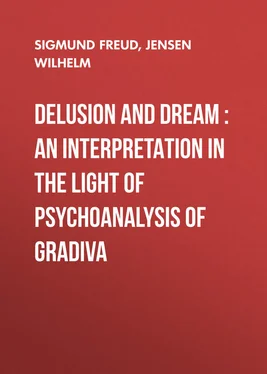Wilhelm Jensen - Delusion and Dream - an Interpretation in the Light of Psychoanalysis of Gradiva
Здесь есть возможность читать онлайн «Wilhelm Jensen - Delusion and Dream - an Interpretation in the Light of Psychoanalysis of Gradiva» — ознакомительный отрывок электронной книги совершенно бесплатно, а после прочтения отрывка купить полную версию. В некоторых случаях можно слушать аудио, скачать через торрент в формате fb2 и присутствует краткое содержание. Жанр: foreign_antique, foreign_prose, на английском языке. Описание произведения, (предисловие) а так же отзывы посетителей доступны на портале библиотеки ЛибКат.
- Название:Delusion and Dream : an Interpretation in the Light of Psychoanalysis of Gradiva
- Автор:
- Жанр:
- Год:неизвестен
- ISBN:нет данных
- Рейтинг книги:4 / 5. Голосов: 1
-
Избранное:Добавить в избранное
- Отзывы:
-
Ваша оценка:
- 80
- 1
- 2
- 3
- 4
- 5
Delusion and Dream : an Interpretation in the Light of Psychoanalysis of Gradiva: краткое содержание, описание и аннотация
Предлагаем к чтению аннотацию, описание, краткое содержание или предисловие (зависит от того, что написал сам автор книги «Delusion and Dream : an Interpretation in the Light of Psychoanalysis of Gradiva»). Если вы не нашли необходимую информацию о книге — напишите в комментариях, мы постараемся отыскать её.
Delusion and Dream : an Interpretation in the Light of Psychoanalysis of Gradiva — читать онлайн ознакомительный отрывок
Ниже представлен текст книги, разбитый по страницам. Система сохранения места последней прочитанной страницы, позволяет с удобством читать онлайн бесплатно книгу «Delusion and Dream : an Interpretation in the Light of Psychoanalysis of Gradiva», без необходимости каждый раз заново искать на чём Вы остановились. Поставьте закладку, и сможете в любой момент перейти на страницу, на которой закончили чтение.
Интервал:
Закладка:
But there again suddenly, unforeseen – only about five paces away from him – in the narrow shadow cast down by a single piece of the upper part of the dining-room portico, which still remained in a state of preservation, sitting on the low steps between two of the yellow pillars was a brightly clad woman who now raised her head. In that way she disclosed to the unnoticed arrival, whose footstep she had apparently just heard, a full view of her face, which produced in him a double feeling, for it appeared to him at the same time unknown and yet also familiar, already seen or imagined; but by his arrested breathing and his heart palpitations, he recognized, unmistakably, to whom it belonged. He had found what he was looking for, what had driven him unconsciously to Pompeii; Gradiva continued her visible existence in the noonday spirit hour and sat here before him, as, in the dream, he had seen her on the steps of the Temple of Apollo. Spread out on her knees lay something white, which he was unable to distinguish clearly; it seemed to be a papyrus sheet, and a red poppy-blossom stood out from it in marked contrast.
In her face surprise was expressed; under the lustrous, brown hair and the beautiful, alabaster brow, two rarely bright, starlike eyes looked at him with questioning amazement. It required only a few moments for him to recognize the conformity of her features with those of the profile. They must be thus, viewed from the front, and therefore, at first glance, they had not been really unfamiliar to him. Near to, her white dress, by its slight tendency to yellow, heightened still more the warm colour; apparently it consisted of a fine, extremely soft, woollen material, which produced abundant folds, and the scarf around her head was of the same. Below, on the nape of the neck, appeared again the shimmering, brown hair artlessly gathered in a single knot; at her throat, under a dainty chin, a little gold clasp held her gown together.
Norbert Hanold dimly perceived that involuntarily he had raised his hand to his soft Panama hat and removed it; and now he said in Greek, “Are you Atalanta, the daughter of Jason, or are you a descendant of the family of the poet, Meleager?”
Without giving an answer, the lady addressed looked at him silently with a calmly wise expression in her eyes, and two thoughts passed through his mind; either her resurrected self could not speak, or she was not of Greek descent and was ignorant of the language. He therefore substituted Latin for it and asked: “Was your father a distinguished Pompeiian citizen of Latin origin?”
To this she was equally silent, only about her delicately curved lips there was a slight quiver as if she were repressing a burst of laughter. Now a feeling of fright came upon him; apparently she was sitting there before him like a silent image, a phantom to whom speech was denied. Consternation at this discovery was stamped fully and distinctly upon his features.
Then, however, her lips could no longer resist the impulse; a real smile played about them and at the same time a voice sounded from between them, “If you wish to speak with me, you must do so in German.”
That was really remarkable from the mouth of a Pompeiian woman who had died two centuries before, or would have been so for a person hearing it in a different state of mind. Yet every oddity escaped Norbert because of two waves of emotion which had rushed over him, one because Gradiva possessed the power of speech, and the other was one which had been forced from his inmost being by her voice. It sounded as clear as was her glance; not sharp, but reminiscent of the tones of a bell, her voice passed through the sunny silence over the blooming poppy-field, and the young archæologist suddenly realized that he had already heard it thus in his imagination, and involuntarily he gave audible expression to his feeling, “I knew that your voice sounded like that.”
One could read in her countenance that she was seeking comprehension of something, but was not finding it. To his last remark she now responded, “How could you? You have never talked with me.”
To him it was not at all remarkable that she spoke German, and, according to present usage, addressed him formally; as she did it, he understood completely that it could not have happened otherwise, and he answered quickly, “No – not talked – but I called to you when you lay down to sleep and stood near you then – your face was as calmly beautiful as if it were of marble. May I beg you – rest it again on the step in that way.”
While he was speaking, something peculiar had occurred. A golden butterfly, faintly tinged with red on the inner edge of its upper wing, fluttered from the poppies toward the pillars, flitted a few times about Gradiva’s head and then rested on the brown, wavy hair above her brow. At the same time, however, she rose, slender and tall, for she stood up with deliberate haste, curtly and silently directed at Norbert another glance, in which something suggested that she considered him demented; then, thrusting her foot forward, she walked out in her characteristic way along the pillars of the old portico. Only fleetingly visible for a while, she finally seemed to have sunk into the earth.
He stood up, breathless, as if stunned; yet with heavy understanding he had grasped what had occurred before his eyes. The noonday ghost hour was over, and in the form of a butterfly, a winged messenger had come up from the asphodel meadows of Hades to admonish the departed one to return. For him something else was associated with this, although in confused indistinctness. He knew that the beautiful butterfly of Mediterranean countries bore the name Cleopatra, and this had also been the name of Caledonian Meleager’s young wife who, in grief over his death, had given herself as sacrifice to those of the lower world.
From his mouth issued a call to the girl who was departing, “Are you coming here again to-morrow in the noon hour?” Yet she did not turn around, gave no answer, and disappeared after a few moments in the corner of the dining-room behind the pillar. Now a compelling impulse suddenly incited him to hasten after her, but her bright dress was no longer visible anywhere; glowing with the hot sun’s rays, the Casa di Meleagro lay about him motionless and silent; only Cleopatra hovered on her red, shimmering, golden wings, making slow circles again above the multitude of poppies.
Конец ознакомительного фрагмента.
Текст предоставлен ООО «ЛитРес».
Прочитайте эту книгу целиком, купив полную легальную версию на ЛитРес.
Безопасно оплатить книгу можно банковской картой Visa, MasterCard, Maestro, со счета мобильного телефона, с платежного терминала, в салоне МТС или Связной, через PayPal, WebMoney, Яндекс.Деньги, QIWI Кошелек, бонусными картами или другим удобным Вам способом.
Интервал:
Закладка:
Похожие книги на «Delusion and Dream : an Interpretation in the Light of Psychoanalysis of Gradiva»
Представляем Вашему вниманию похожие книги на «Delusion and Dream : an Interpretation in the Light of Psychoanalysis of Gradiva» списком для выбора. Мы отобрали схожую по названию и смыслу литературу в надежде предоставить читателям больше вариантов отыскать новые, интересные, ещё непрочитанные произведения.
Обсуждение, отзывы о книге «Delusion and Dream : an Interpretation in the Light of Psychoanalysis of Gradiva» и просто собственные мнения читателей. Оставьте ваши комментарии, напишите, что Вы думаете о произведении, его смысле или главных героях. Укажите что конкретно понравилось, а что нет, и почему Вы так считаете.












